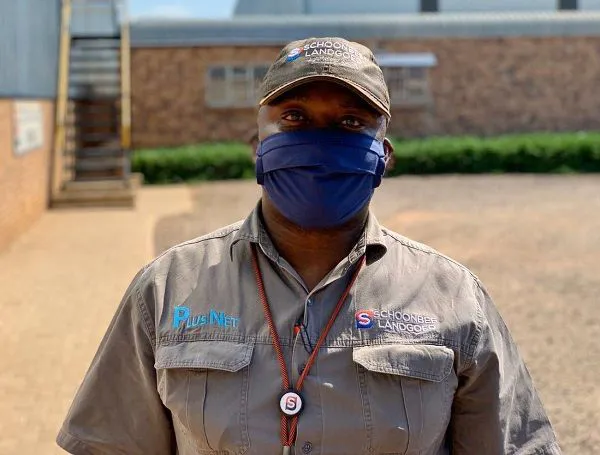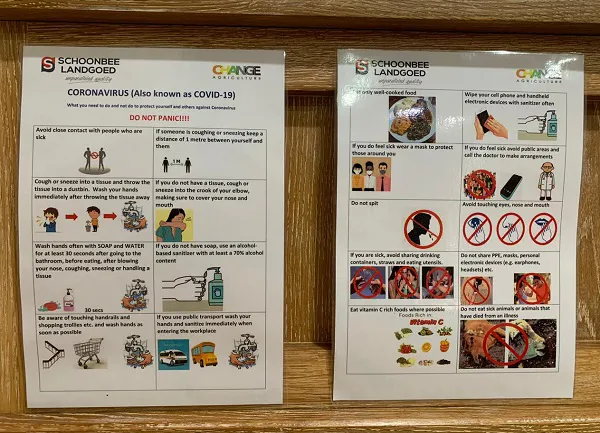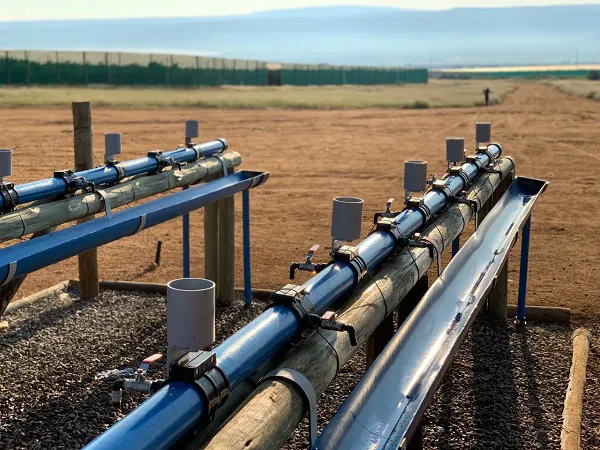As South Africa records its first coronavirus mortalities on the first day of lockdown, fruit production continues and the Southern Hemisphere’s entry into the citrus market looks more positive than last year.
The strong demand in the Northern Hemisphere as well locally for citrus and particularly lemons (due to its high Vitamin C content), more so than for other categories like grapes, berries and stonefruit, is a compelling reason for citrus producers to continue for the following 21 days of national lockdown, but it hasn’t been easy.
“There has been a tremendous amount of information clutter on the coronavirus lockdown, making it challenging to know what to trust and what is applicable, but we’ve been enormously assisted by organised agriculture, AgriSA and AgriLimpopo and in our area AgriLoskop,” says Gert Upton (right), senior manager of marketing and sales at Schoonbee Landgoed outside Groblersdal, Limpopo Province.
Schoonbee Landgoed has been offering free lemons to staff (with good uptake) and when the clementines start, that too will be available in an effort to improve general immunity.
The company, which opened an on-farm clinic in 2018, started taking precautions three weeks ago, as they realised the gravity of the situation. The citrus season started the second week of March.
 Schoonbee personnel have been issued with face masks and gloves (photos supplied by Schoonbee Landgoed)
Schoonbee personnel have been issued with face masks and gloves (photos supplied by Schoonbee Landgoed)
In two weeks their clementine harvest starts, soon after that Novas, all the while running along with lemons until week 23.
Coronavirus preparations
Their early start to preparations allowed them to procure resources like temperature scanners for the farm’s entrance (the temperature of every single person is measured upon entering) and face masks, hand sanitisers for the farm although, Gert says, there was already limited stock available as the broader food sector also started preparing for a crisis.
Hand wash stations at workstations and entrances to all packing facilities were installed and all transport channels sanitised regularly. They continuously monitor the temperature of all personnel in the packhouse to ensure a safe working environment.
 Protocol cards with visual and written instructions at all entry points
Protocol cards with visual and written instructions at all entry points
Since Monday, when the country’s president announced the impending lockdown, they have had to do a great deal of paperwork, including registering with the Department of Trade and Industry and the Companies and Intellectual Property Commission on essential services, arranging permits for staff stating they are performing an essential service and so forth.
Their retail partners have been very supportive in helping them navigate through a maze of information, issuing certificates for truck drivers to travel to distribution centres (with no stops allowed on the way).
Lunchtime crowds and public transport key points of concern
In the orchard the size of harvesting teams has been reduced from 100 to 30 or 40 so that pickers are more widely spaced; the amount of fruit entering the packhouses are unaffected, but labour administration is more complicated.
Packhouse workers arrive on the farm before harvesters now, to reduce the confluence of people. Most staff are reliant on public transport, specifically minibus taxis. The company have put contracts in place to ensure minibus drivers only transport Schoonbee staff, guaranteeing that vehicles are properly sanitised and controlled. They have also reduced the amount of people per vehicle and doubled the number of vehicles available for transport.
He notes that the packing stations in their citrus packhouse are, fortuitously, about a metre and a half apart, so social distancing isn’t the main problem there: is it to keep people apart during lunchtime and to manage proximity on public transport, as the vast majority of staff take minibus taxis.
 Handwashing stations before entering the farm, both existing and newly installed in response to the coronavirus
Handwashing stations before entering the farm, both existing and newly installed in response to the coronavirus
Gert shares his concern on a bleak outcome due to a lack of basic discipline in general from citizens, not to mention the pandemic, compounded by a lack of information and even misconceptions that it is a disease only lethal to Chinese people. The level of interaction during the lockdown between citizens and the police and the army causes anxiety.
“People haven’t felt it personally yet,” he says. “These are very uncertain times and we’re taking it day by day. We’re staying calm, making sure our people remain healthy while assisting to feed our country and abroad, with our fellow farmers.”
The crisis could well lead to a renewed appreciation of the vital importance of the agricultural sector in South Africa, he feels.
For more information:
Gert Upton Schoonbee Landgoed
Schoonbee Landgoed
Tel: +27 13 262 4000
Email: marketing@schoonbee.co.za
http://schoonbee.co.za
